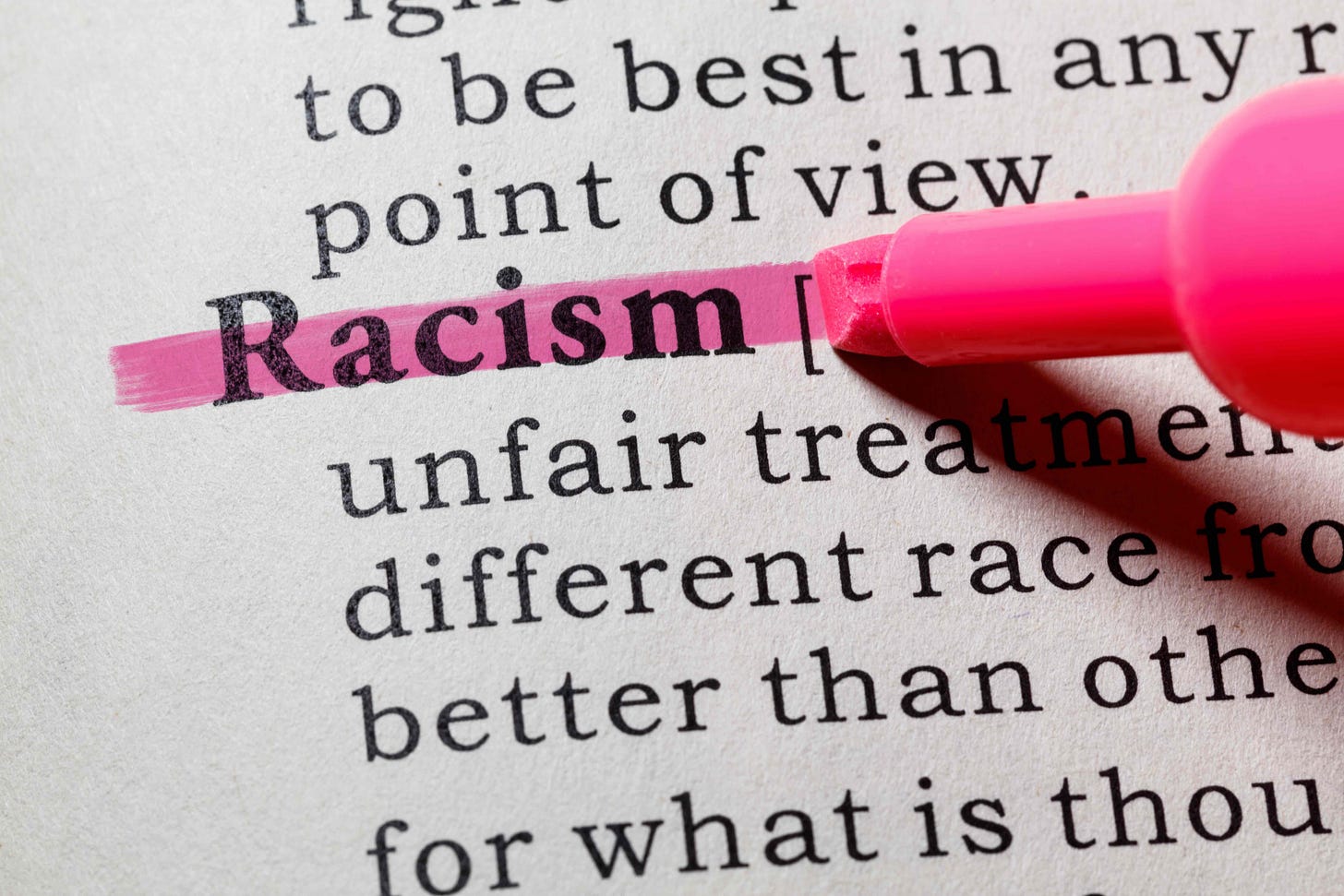E-Pluribus | July 23, 2021
Enough with the apologies, winning the wokeism war, and defending old-fashioned "racism" (just the old definition, of course).
A round up of the latest and best writing and musings on the rise of illiberalism in the public discourse:
Seth Moskowitz: Don’t Apologize
A well-executed cancel culture attack often bullies the victim into a grovelling apology in hopes of dodging the worst of the consequences. Seth Moskowitz of Persuasion says it’s time to take a stand and refuse to allocute to an offense that wasn’t committed. Sincere apologies for actual wrongdoing are good and proper; false ones simply incentivise the mob to seek out another target.
Today, the mob acts primarily through social media, meaning that the pile-on can come for anybody, at any time, with little to no warning. The critics humiliate their victim until the accused issues an apology to end the nightmare. And then the mob either doubles down, or it moves on to its next subject.
In the long run, obsequious apologies for imagined crimes pave the way for a destructive cycle of inquisition. Unless brave people stand up and say, “Enough,” the mob will continue steamrolling victims, leaving behind a trail of careers, reputations, and a culture of conformity.
So, if the mob comes for you and you don’t believe you have done anything wrong, I have a modest proposal: Don’t apologize.
It doesn’t matter where the denunciations come from—left or right, allies or adversaries. If you face public criticism, you should first seriously contemplate if you have, in fact, done something wrong. If so, go ahead and apologize. Acknowledging mistakes is a sign of maturity and can be healing. But if not, don’t. Defend yourself against the mob—and if that is asking too much, log off and let the critics tweet into the void.
Read it the whole thing.
Nicholas Clairmont: A path to victory in the wokeism war
In a long piece at the Washington Examiner, Nicholas Clairmont lays out some principles and concrete actions to combat what he sees as a more serious iteration of illiberalism than the political correctness of the 1990s. Resisting the urge for top-down solutions by both sides is key to overcoming the push for ideological conformity and homogeneity.
Certainly, the government and school boards have the right to set curricula in the schools they require children to attend and that citizens fund. And it is a worthwhile project simply to not lie about what is happening — to name it, and to acknowledge that a new and genuinely philosophically distinct ideology has supplanted the prior liberal conception in many precincts of American public life. Yet it is one thing to refuse to continue to fund an unpopular and illiberal ideology being taught to children in school without their parents’ understanding by teachers following a curriculum, or being trained into workers against their will by HR compliance specialists. It is quite another to use state power to punish or ban endorsing or even mentioning certain disfavored ideas in institutions of higher learning, corporations, and government bureaucracy. There must be limiting conditions so that the fight against wokeism does not itself become illiberal.
Yet navigating this obstacle course isn’t impossible. Here is how a liberal can stop the march through the institutions without losing his or her liberalism.
1. It is legitimate and desirable to ban completely from public K-12 curricula the inculcation of race essentialism. Curricula should be banned especially when some characteristic is imputed to particular children or when they encourage children to think about their own moral status according to ascriptive demographic characteristics rather than actions and traits they individually perform or express. This applies narrowly to race and not sex or national origin or sexual orientation or gender identity, though it is virtually always socially and civically inappropriate in practice to do so with regard to those as well. It shall not be regarded as legitimate to withhold state accreditation from K-12 private schools because they teach something that is banned in public schools.
2. It is not legitimate or desirable to surveil and punish teachers in case they do individually teach something that could be (rightly or wrongly) defined as race essentialist or as being an instance of critical race theory. There are legitimate limits to how teachers can speak and behave in the classroom, but one of them should not be mentioning things banned from the curriculum by virtue of the concerns expressed here. What we should oppose is simply that certain subjects or ideas be a curricular requirement.
Read it all.
Matthew Yglesias: In defense of the old-fashioned idea of "racism"
While the left has generally considered Ibram X. Kendi the de facto oracle on race for the past several years, Matthew Yglesias questions some of Kendi’s most basic assumptions about the subject, including why journalists seem reluctant to call him on what Yglesias terms the “weirdness” of some of his ideas. Yglesias argues that the Kendi-ist concept of racism is inadequate to address the issue and actually complicates finding solutions to broader social and economic problems.
To me, one of the weirder phenomena of the past 12 to 18 months in American life is the way that Ibram X. Kendi has become this widely quoted, widely interviewed, widely celebrated figure, and yet hardly anyone has asked him about the most provocative and distinctive ideas in his book.
When the book was first published in 2019, that’s not how it was received. Kelefa Sanneh’s excellent review in the New Yorker heads straight for what I think is the core weirdness of Kendi’s ideas. If we accept the definition that a racist is a person who supports racist policies, and what makes a policy racist is that it “produces or sustains racial inequity,” then determining which policies are racist requires exhaustive analysis of controversial empirical questions. Sanneh uses the example of “ban the box” laws which prohibit employers from asking about past criminal convictions. Many activists and the National Employment Law Center regard this as an important anti-racist measure since African Americans are more likely to have prior convictions and thus be disadvantaged by this question.
But Jennifer Doleac and Benjamin Hansen find that “ban the box” laws lead to worse employment outcomes for Black men because absent specific information about past criminal records, employers engage in statistical discrimination.1
“Are these laws and their supporters racist?” Sanneh asks. “In Kendi’s framework, the only possible answer is: wait and see.”
Sanneh’s review suggests, rightly, that neither Kendi nor anyone else can consistently stick with this empiricist concept of racism. That the visceral reaction to animus, bias, and discrimination is still with us and still works as the primary meaning of “racism,” even for people who would like to officially move to something more like Kendi-ism.
Read it all here.
Around Twitter
Will attempts to cure “misinformation” be worse that the disease?
A point to ponder via Peter Boghossian:
A DC politician is reportedly going to propose creating autonomous African American areas within the city. Via the Foundation Against Intolerance & Racism:
And finally, when you’re right, you’re right:











